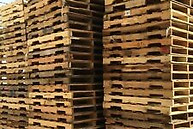top of page

ISO 9001:2015
The casting industry is a driving force in the sustainability of both materials and energy

Green Sand Woodland Aluminum LLC uses 120 tons of green sand per hour. To make this happen, we must recycle. Our engineered sand system is used to recycle the sand for almost zero waste. Our green sand is made up sand, clay, flower and water. Unlike petrobond systems, we do not use oils as a bonding agent. Therefore, nothing but steam is emitted from the molds.
No Bake or Airset Sand is a chemically bonded sand used in making cores and large complex molds. Woodland Aluminum LLC uses a water based resin which allows us to recycle up to 80% of the sand, and unlike petrochemical resins, dramatically reduces the overall emissions to employees and the environment. The sand we can no longer use has been tested safe and is beneficially used for daily cover of local landfills.


Aluminum Woodland Aluminum LLC uses only certified metal to meet our customers high demands. We segregate the gating and riser's by alloy. All dross produced during the melting process is shipped to a smelter for remelting, refining and reuse.
LED Lighting Woodland Aluminum LLC has worked with our local electric and power companies to reduce our energy consumption. Installation of new LED Lighting, as well as new HVAC systems have significantly reduced our energy consumption.


Pallets and Shipping Material Woodland Aluminum LLC has made a huge effort to reduce our waste. All of our shipping pallets meet international shipping standards. They are produced from recycled wood. Using recycled wood aids in eliminating the need to further harvest trees, therefor saving our forests. Our shipping materials are also made from recycled products and a recycling program is in place to recycle any paper and cardboard waste.
Recycling Program Woodland Aluminum LLC recycling programs have reduced the waste that normally would go to landfills by as much as 75 percent. Today as little as four yards per week are taken to the landfill. All other manufacturing waste has been collected and recycled through our various programs.

bottom of page